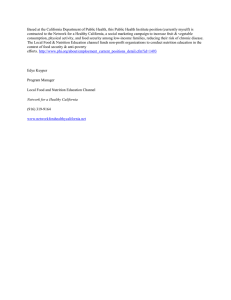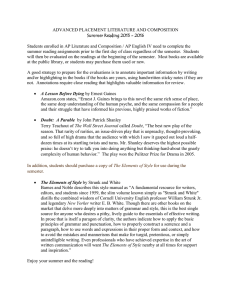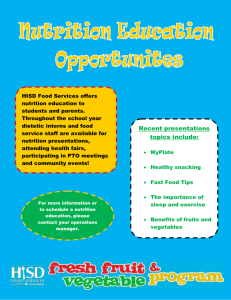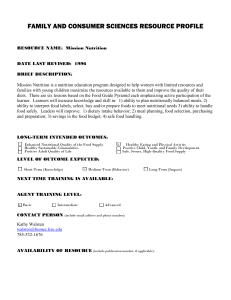Syllabus: FOOD-GE 2021 Food Writing for Professionals--Spring 2012
advertisement
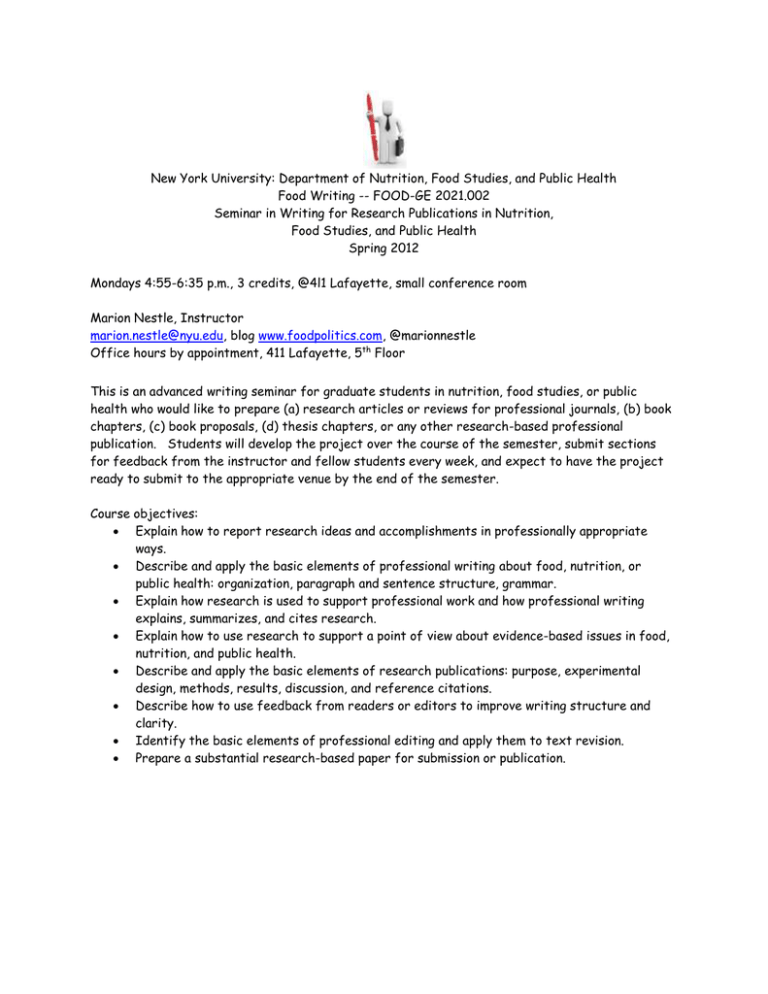
New York University: Department of Nutrition, Food Studies, and Public Health Food Writing -- FOOD-GE 2021.002 Seminar in Writing for Research Publications in Nutrition, Food Studies, and Public Health Spring 2012 Mondays 4:55-6:35 p.m., 3 credits, @4l1 Lafayette, small conference room Marion Nestle, Instructor marion.nestle@nyu.edu, blog www.foodpolitics.com, @marionnestle Office hours by appointment, 411 Lafayette, 5th Floor This is an advanced writing seminar for graduate students in nutrition, food studies, or public health who would like to prepare (a) research articles or reviews for professional journals, (b) book chapters, (c) book proposals, (d) thesis chapters, or any other research-based professional publication. Students will develop the project over the course of the semester, submit sections for feedback from the instructor and fellow students every week, and expect to have the project ready to submit to the appropriate venue by the end of the semester. Course objectives: Explain how to report research ideas and accomplishments in professionally appropriate ways. Describe and apply the basic elements of professional writing about food, nutrition, or public health: organization, paragraph and sentence structure, grammar. Explain how research is used to support professional work and how professional writing explains, summarizes, and cites research. Explain how to use research to support a point of view about evidence-based issues in food, nutrition, and public health. Describe and apply the basic elements of research publications: purpose, experimental design, methods, results, discussion, and reference citations. Describe how to use feedback from readers or editors to improve writing structure and clarity. Identify the basic elements of professional editing and apply them to text revision. Prepare a substantial research-based paper for submission or publication. Books Phyllis Goldenberg. Writing a Research Paper: A Step-by-Step Approach, 2004. William Strunk, Jr and E.B. White. The Elements of Style, 4th ed, 1999 or any other edition. Other readings Instructor and students will bring in pieces of professional writing for discussion. Submission of work All work—no exceptions—must be double-spaced, one side of paper, at least one-inch margins all around, not right justified, two spaces between sentences, pages numbered. It must be submitted on time in the required number of copies, stapled. Course organization Every week, students will submit work for review as well as reviews of the work of other students. This will be organized during the first class session and during subsequent sessions depending on individual needs. By the end of the class, all students will have given and received feedback from all other class members, more than once. Course expectation By the end of the course, all students will have prepared and completed a finished piece of professional writing ready to submit. PROFESSIONAL WRITING CLASS SCHEDULE, SPRING 2011 (Rough Outline) CLASS DATE TOPIC 1 January 23 Introduction: organizing the course 2 January 30 Identifying the topic 3 February 6 Introducing the topic 4 February 13 Introductions, continued February 20 President’s Day 5 February 27 Introductions 6 March 5 March 12 7 March 19 8 March 26 9 April 2 10 April 9 11 April 16 12 April 23 13 April 30 14 May 7 ASSIGNMENTS These should be completed and ready to discuss by the indicated class date. Read (browse) “Writing a Research Paper” to page 70. Read: Strunk & White section I Write: 2-page summary of your project, 2 copies Read: Strunk & White sections II and III Read: Strunk & White sections IV and V Read: “Writing a Research Paper” parts 6 and 7 Draft of complete Introduction (with references); outline of remainder Finish: “Writing a Research Paper” parts 8-10 Spring Break First draft of final paper Second draft for review Third draft for review TBA Submit final paper
